
Earth
5 Ways Organic Valley Is Making An Impact
Here at Organic Valley, we’re committed to making a positive impact and growing in a way that aligns with our mission and values. This means ensuring that the way we run our business benefits our farmers, our employees, the families who eat our products, and the planet we all call home.
With your support throughout 2020, we continued to up our game—even in the midst of a pandemic—and we’re proud of the work we’re doing.
To kick off the publication of our 2021 Impact Report, here are five big ways (but certainly not the only ways!) Organic Valley makes an impact on people, animals, and our earth.
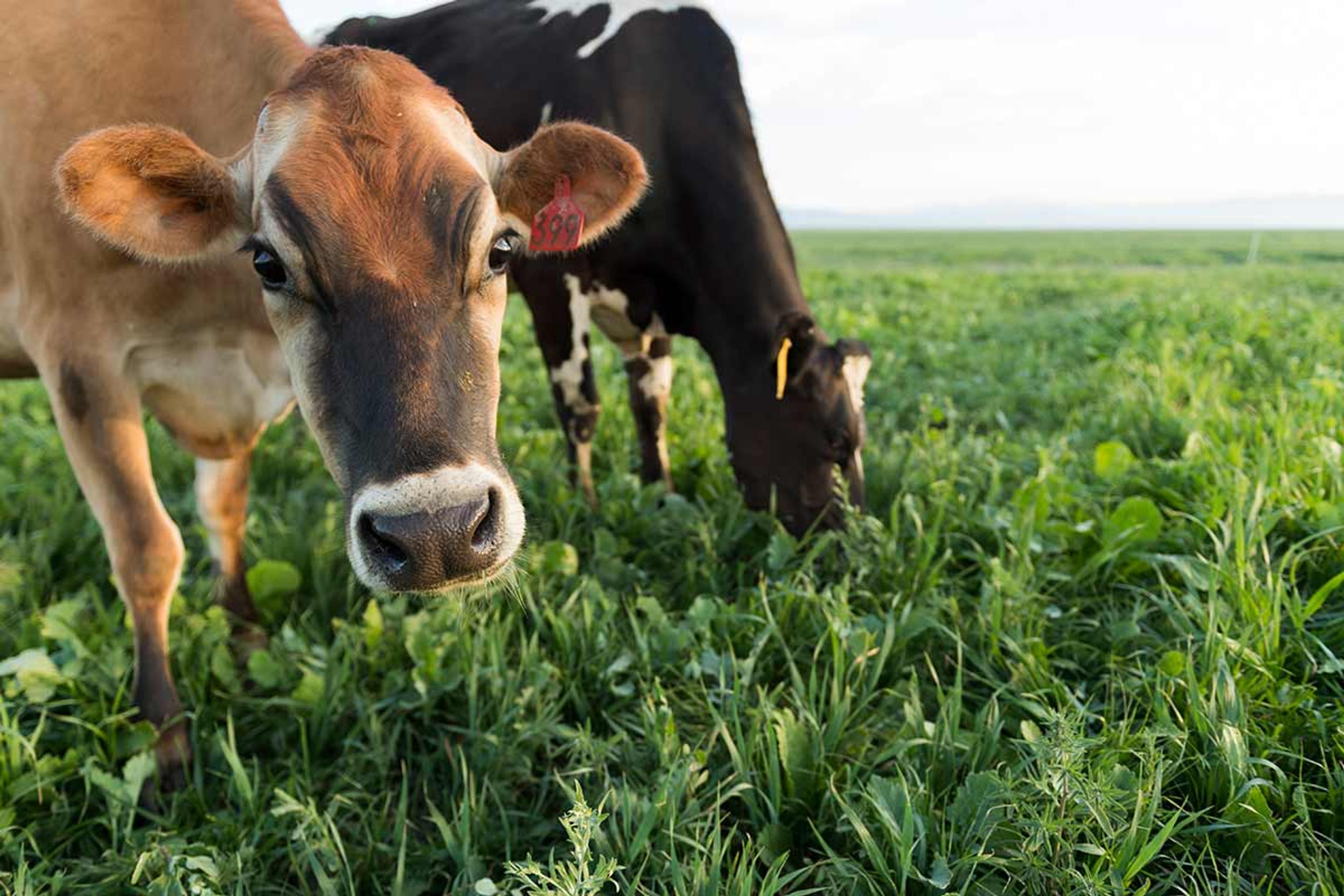
Cows graze a pasture filled with a diverse mix of greens that not only provide the cows with good nutrition, but also prevent erosion and draw carbon into the soil, which rebuilds it over time! Sauder Family Farm, Colorado.
Organic, Pasture-Based Farming
A foundational tenet of organic agriculture—and a special passion of ours here at Organic Valley—is pasture-based farming, which comes with a slew of benefits for everyone involved.
Cows know a good thing when they see it, and we’re taking our cues from them. Grass is, of course, excellent nutrition for cows, which they convert into nutritious and tasty food for us. But so much also happens at or below ground level.
Well-managed pasture eliminates the need for tilling the ground and pulls carbon from the atmosphere and stores it in the soil. Grass isn’t just tasty for our cows; it’s also good for our earth!
It’s common knowledge that many of the chemicals used in agriculture are bad for our bodies and bad for our environment. That’s part of the reason we farm organically and, very likely, part of the reason you love our food! Organic means no toxic synthetic chemicals, and we’re thrilled to report that since 1988 we’ve kept 440 million pounds of chemicals off of the land simply by farming organically. And you played a role in this achievement by supporting our products!
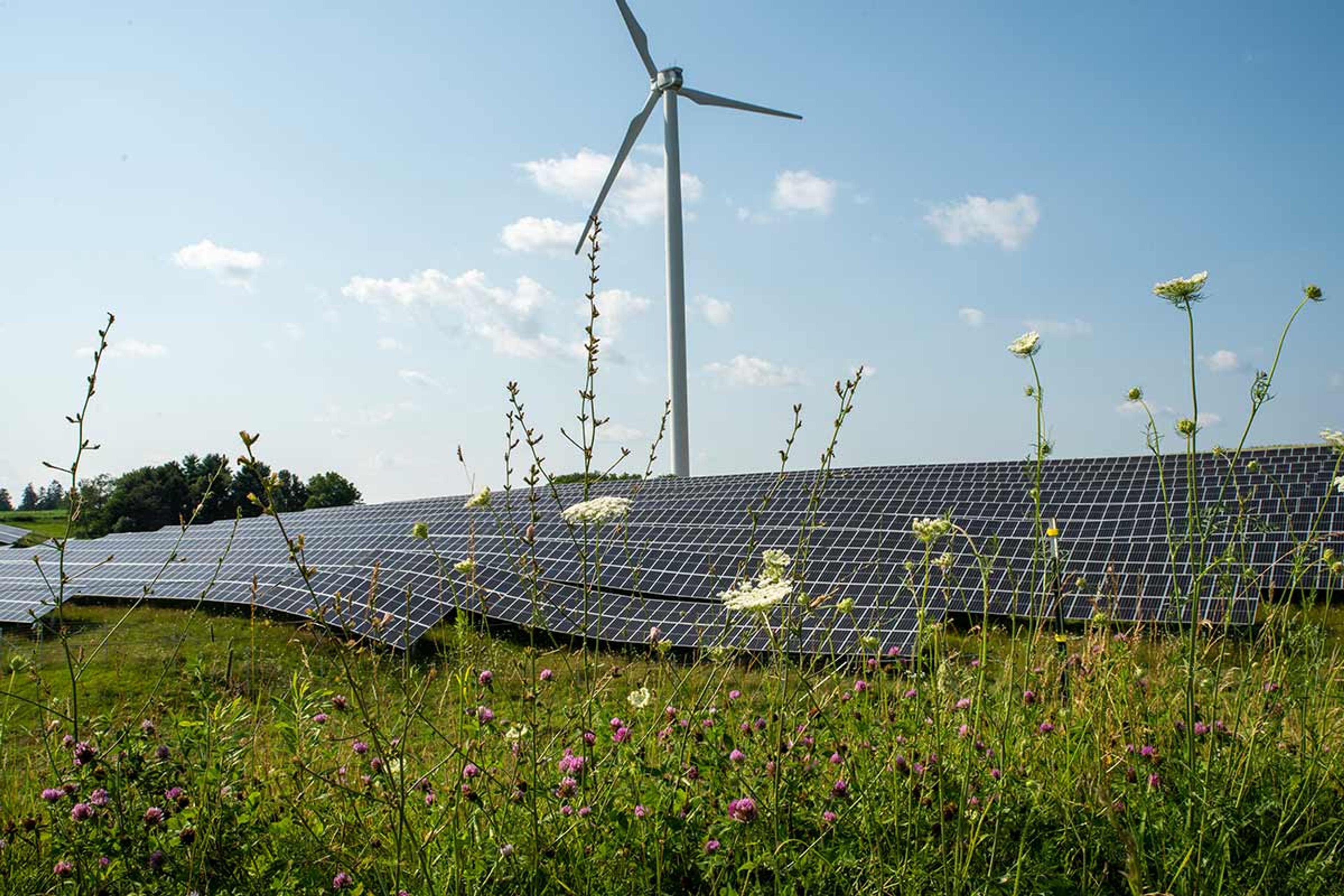
Wind and solar provide 100% renewable electricity to Organic Valley’s owned facilities.
Renewable Energy
In 2019, we achieved our goal of powering our owned facilities with 100% renewable electricity from wind and solar!
Our farms are also increasing their use of renewable energy. 10% of Organic Valley farms currently use renewable energy systems to supplement their on-farm energy use, and each year, more farmers are exploring their options by getting farm energy assessments and applying for grants to fund renewable energy installations and energy efficiency improvements.
As an organization, Organic Valley is committed to preserving the planet for generations to come, and building a sustainable, renewable-powered business is only one part of that commitment. In our 2021 Impact Report, we share our cooperative’s five-year Climate Action Plan, which includes myriad actions we’re taking both as a business and on our farms.
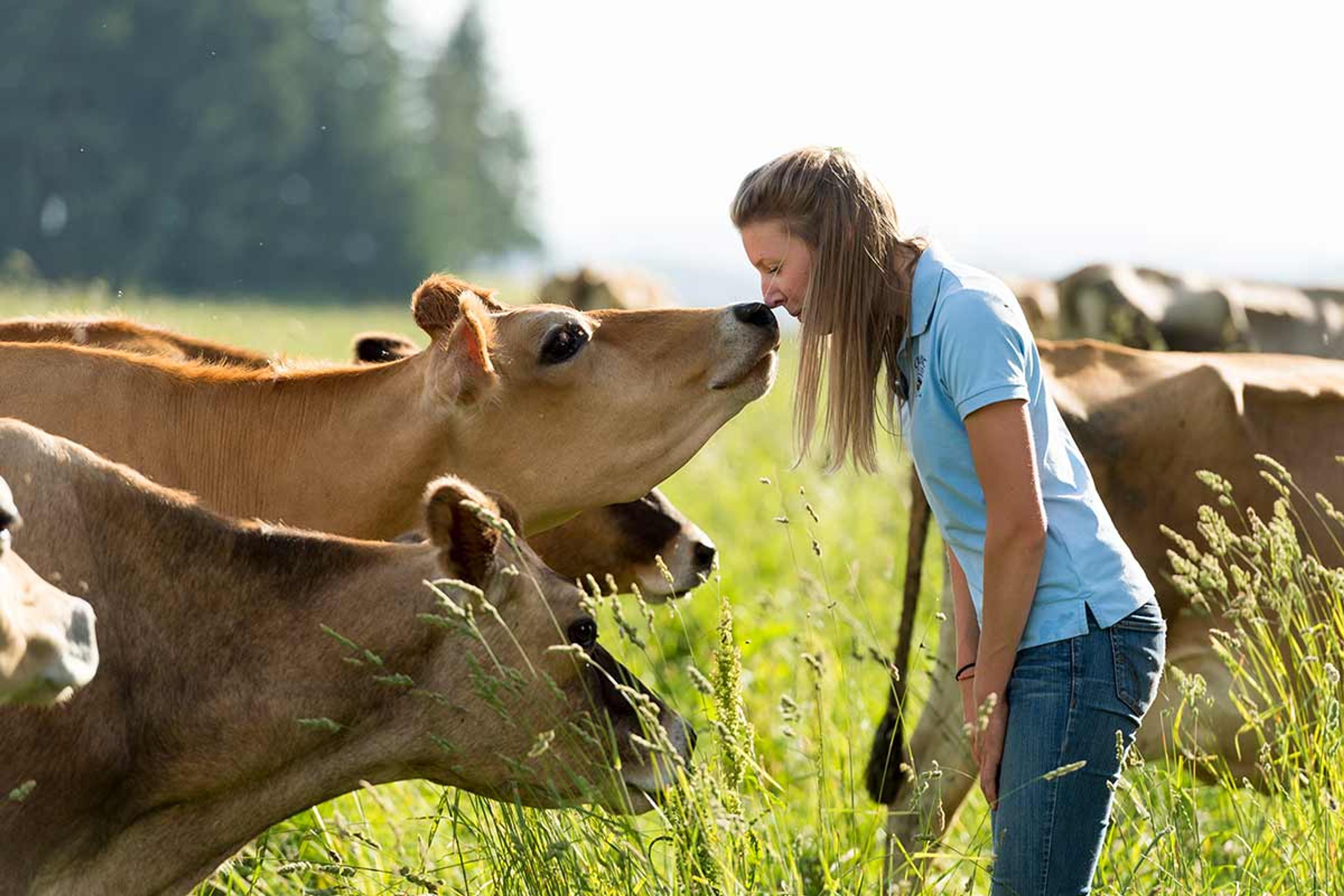
Our cows are like family. Organic Valley farmers develop relationships with their cows and recognize their individual needs and quirks. We work hard to give all of our animals the best quality of life that we can, and which they deserve! Double J Jerseys, Bansen Family, Oregon.
Animal Well-being
We strive for the highest level of animal care and well-being because we believe that happy, healthy animals produce great-tasting, nutritious products.
Organic Valley dairy cows get to spend more time outside than 95% of the dairy cows in the U.S. Our farmers also have access to a full team of veterinarians and animal health experts who help them provide top-quality care to their animals. In fact, our staff and farmers co-created Organic Valley’s animal care program that focuses on observable measures such as an animal’s body condition and cleanliness, which is as close as we can get to asking a cow how she is doing.
We also back up our internal standards with other well-known animal care certifications such as Certified Humane® for our eggs, Global Animal Partnership for hogs, and others.
Finally, Organic Valley’s internal animal care standards apply to all animals on the farm—livestock, working animals, even the farm dogs and barn cats.
We work hand in hand with nature to give all our animals a happy, healthy life.
Related: Here’s more about the certification programs we participate in. And in addition, for Organic Valley hens, Free to Forage™ means that our birds get plenty of fresh air, sunshine, and pasture.
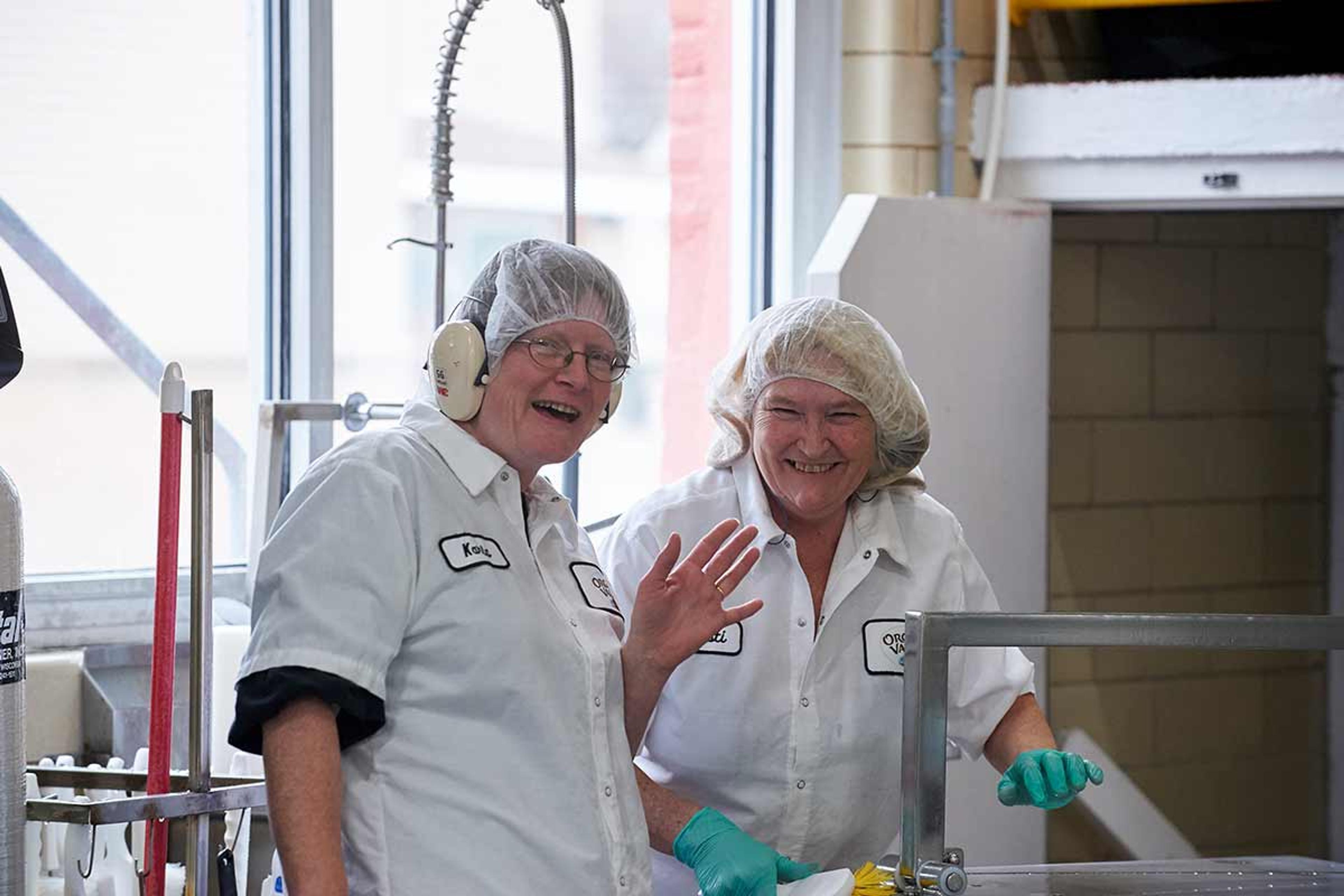
Karla Strait and Kristi Volden, part of the Organic Valley cheese production team.
Stable, Sustainable Pay for All
While delicious organic food is our pride and joy, none of our products would reach consumers without the hard work of incredible humans. From the farmers who care for land and animals and grow our food, to the people who turn it into products, pack and ship those products, market them, coordinate, strategize, talk to consumers, and make sales—our cooperative is powered by people.
What many don’t realize is that most dairy farmers in the U.S. don’t get a stable salary. They are at the mercy of commodity markets, which fluctuate day to day, so they may not even know what they’ll get paid until they see their check. Our founders didn’t think that was right, so they created a new model—stable, sustainable, farmer-approved pay prices through a cooperatively-owned business—and we’ve upheld that mission throughout our 33-year history.
In 2019, we achieved a $15 minimum wage for employees across our organization, and we continued to celebrate and uphold this standard in 2020. Paying our employees at least $15 per hour is important to us because it is—quite simply—the right thing to do.
Everyone deserves the chance to earn a living wage.
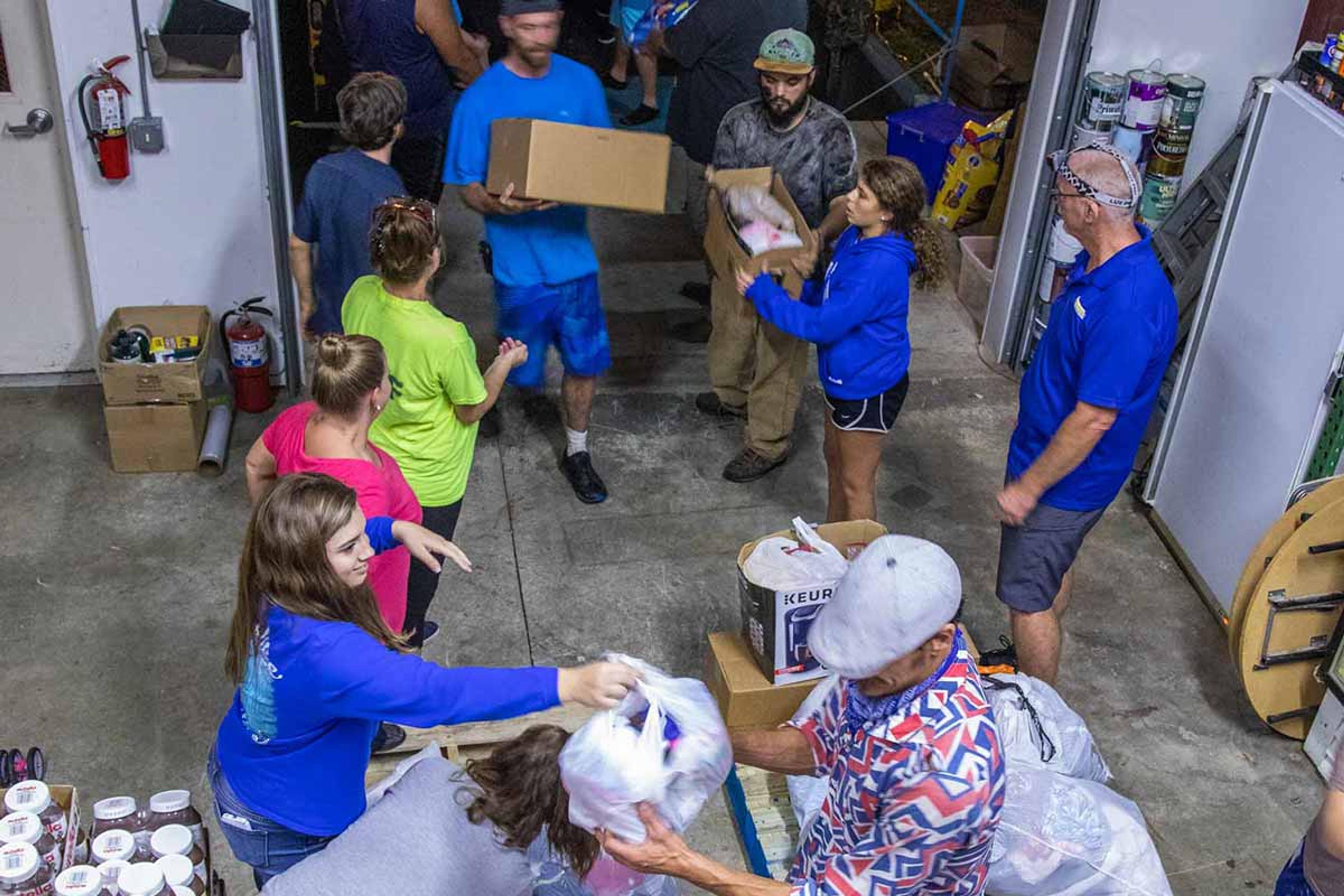
Hurricane Florence relief in North Carolina. Photo courtesy of Grassroots Aid Partnership.
Giving Back to Our Communities
Since 2015, we’ve supported more than 1,000 mission-aligned nonprofit organizations with grant funding, nutritious organic food, and silent auction kits for fundraisers. From little things like providing string cheese snacks at community events to big things like bringing truckloads of food donations to food banks and disaster relief initiatives, we believe it’s crucial to invest in the communities that invest in us.
Disaster relief is important to Organic Valley because, unfortunately, climate change is already here. While we can’t easily reverse what’s already been done and we’re working hard to reduce our footprint, we're also committed to doing our part to help others weather the storms of our current climate crisis.
“Concern for community” is one of the seven International Cooperative Principles that guide all cooperatives around the world. We believe giving back to and being there for our communities is an important part of being a cooperative business.
These are just five of the many ways Organic Valley is making a positive impact on people, animals, and the earth. We are thankful every day for all the people, like you, who have purchased our organic products over the years. Because that small act has made it possible for Organic Valley to grow into a business that can take impactful actions such as these.

Want to learn more?
We are committed to doing our part to create a healthy, regenerative, socially responsible business and world. Check out our 2021 Impact Report to learn about all the things Organic Valley is doing to make a positive impact on people, animals, and our earth.
Related Articles
- Tags:
- animal care,
- cooperative spirit,
- giving back to communities,
- grass-fed,
- pasture & perennial agriculture,
- disaster relief,
- renewable energy















